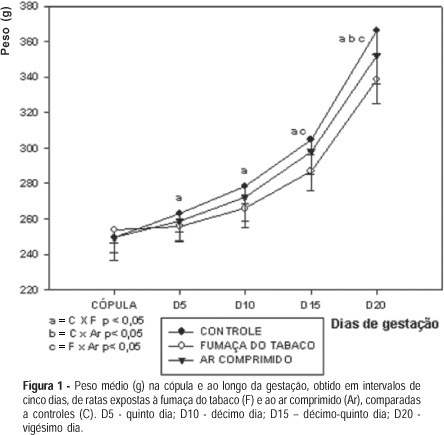Revista Brasileira de Ginecologia e Obstetrícia. 2006;28(3):143-150

PURPOSE: to analyze the effect of cigarette smoke on weight gain and food consumption of female pregnant rats, as well as of their offspring’s weight and length at birth METHODS: Wistar rats were studied from the second day until the end of pregnancy. Fifty-one female rats were divided into three groups: Group F: 15 rats exposed to tobacco smoke (2 cigarettes/animal/day) plus air flush (10 L/min); Group Air: 18 rats exposed to air flush only (10 L/min); Group C: 18 non-exposed, non-manipulated controls. Body weight was measured every 5 days and food consumption every seven days (expressed as medium consumption per day). Offspring weight and length were measured on the first day of life. The Lavene test was used to verify the behavior of numeric variable distribution and for parametric one-way ANOVA analysis and Student’s t test were used, according to the case. Results with p<0.05 were considered to be statistically significant. RESULTS: the rats of Group F consumed less food per day [Group F=18.9 g (±1.2) vs Group Air=21.7 g (±1,6) vs Group C=24.2g (±1,7); (p<0,05)], gained less weight during pregnancy than the animals of the air flush group and the control group: Group F=338.9 g (±13.7) vs Group Air=352.3g (±15,9) vs Group C=366.3 g (±13.1) (p<0.05). Pups birth weight and length were significantly smaller in the smoking group when compared to controls and to the air flush group, while these last two groups did not differ: Group F=5.5 g (±0.3) vs Group Air=5.9 g (±0,5) vs Group C=5.9 g (±0.4) - (p<0,01); Group F=6.8 cm (±0.2) vs Group Air=6.9 cm (±0,2) vs Group C=6.9 cm (±0.1) - (p<0.05), respectively. CONCLUSIONS: tobacco smoke exposure reduced the weight gain and food consumption during pregnancy and reduced the offspring weight and length evaluated at birth.
Search
Search in:


Comments